Many people use an aloe vera supplement because it’s great for your skin and it can fight oxidative damage, help build collagen, and possibly even help control blood sugar.
It’s not just for use after a bad sunburn. Read on if you want to find out about the best aloe vera supplements on the market right now and who should and shouldn’t use them.
Research
Rankings
Last updated: April 12, 2023
Aloe vera supplements considered: 22
Hours of research: 32
Experts reviewed: 5
Scientific papers referenced: 29
1. Earthen Aloe Vera
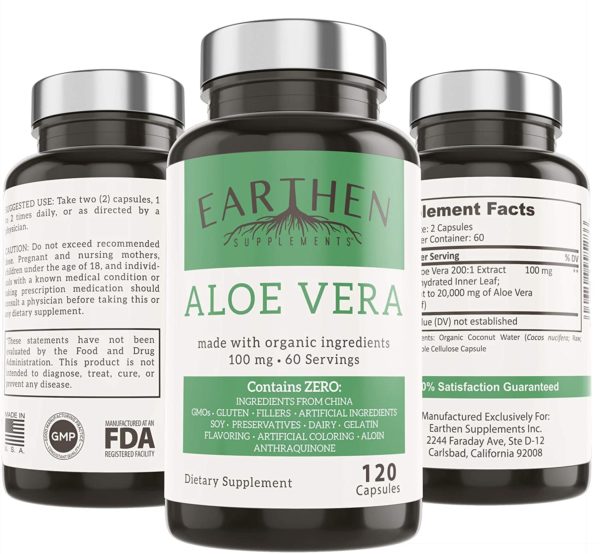
Earthen Aloe Vera is vegan-friendly, delivers 10 grams equivalent of aloe vera, and uses organic coconut water to buffer the aloe vera in the capsule.
The dosage is very solid, and the purity of the capsules is excellent. Add to that the all-natural coconut water buffering, and you’ve got a winning formulation. Plus, the capsules make dosing dead-simple.
This ultra-pure formulation makes it a no-brainer for our top overall pick.
2. NOW Aloe Vera Gels
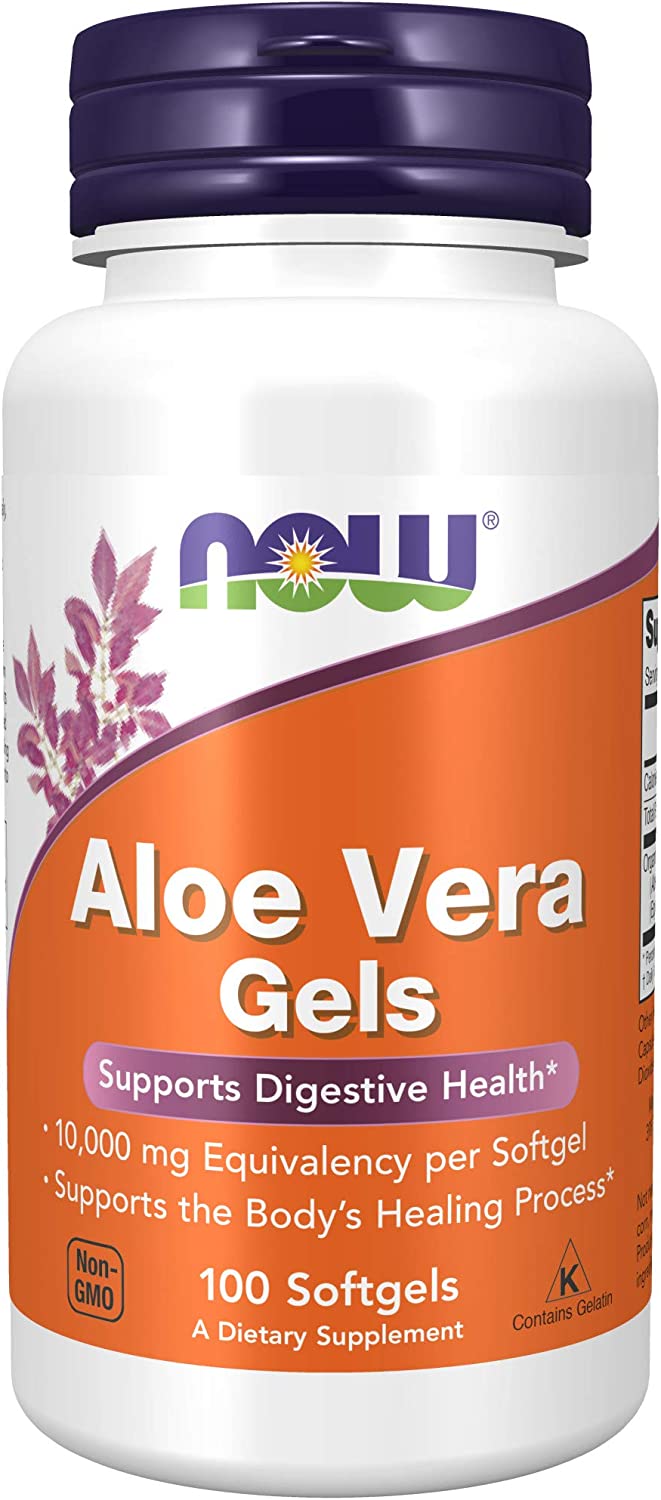
If you are looking for an easy solution for taking aloe vera, NOW Aloe Vera Gels are a good bet. They are pure, popular, and come in a capsule that delivers 10 grams equivalent of aloe vera.
The aloe vera gel is dissolved in olive oil and is delivered via a gelatin capsule–this does mean that vegans are out of luck with this product, but there are plenty of other non-animal product options out there.
3. George’s “Always Active” Aloe
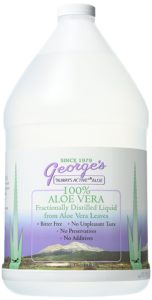
If you want to cut out the middleman, or use your aloe vera for a multitude of purposes, the only way to go is with a large jug of liquid, and George’s brand is the cream of the crop. The imposing one-gallon jug contains dozens of servings of distilled aloe vera juice.
Aloe vera liquid is the only ingredient, and the jug is labeled for nutritional use, so you can be sure it’s pure enough to drink as well as to rub on your skin or to incorporate into your own homemade cosmetic products.
4. Dynamic Health Labs Organic Aloe Vera Juice
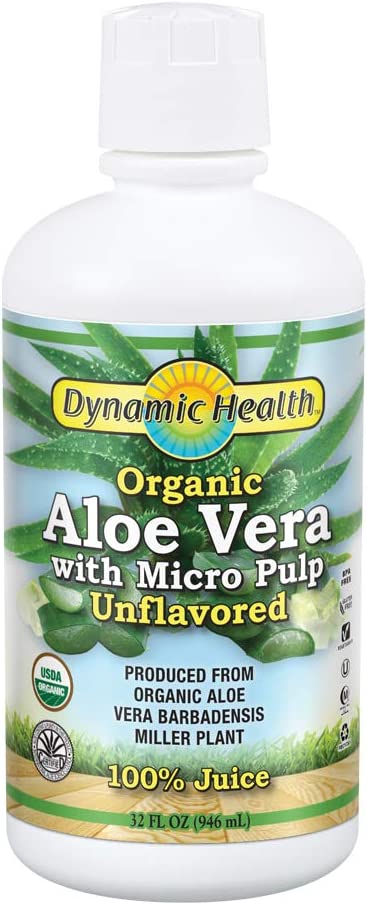
Dynamic Health Labs focuses on offering a highly pure, well-tested aloe vera juice. This premium product comes at a higher cost, of course, but if you prioritize having organic ingredients, it’s a fantastic choice.
The sole ingredient is organic aloe vera juice, and Dynamic Health Labs contracts with an independent laboratory for purity testing. If you want to be absolutely sure about what you are putting in your body, there’s no other way to go.
5. NutriWorth Organic Aloe Vera Gels
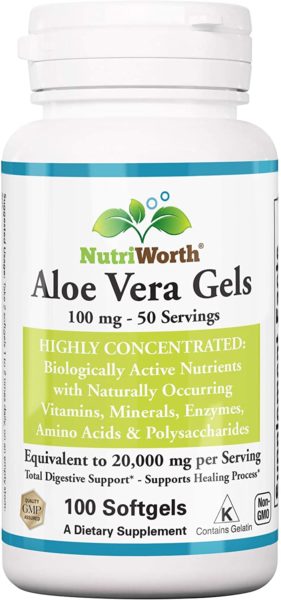
NutriWorth makes a pretty legit aloe vera gel supplement. Each gelatin capsule delivers 50 mg of 200:1 organic aloe vera gel concentrate, and it’s dissolved in organic olive oil to boot.
You will have to pay extra for the privilege of having organic ingredients, but that’s always how it goes. It costs more money to produce, so it’s going to cost more money for you to buy it. But for an organic capsule-based aloe vera solution, NutriWorth can’t be beat.
6. Nature’s Way Aloe Vera Leaf Juice
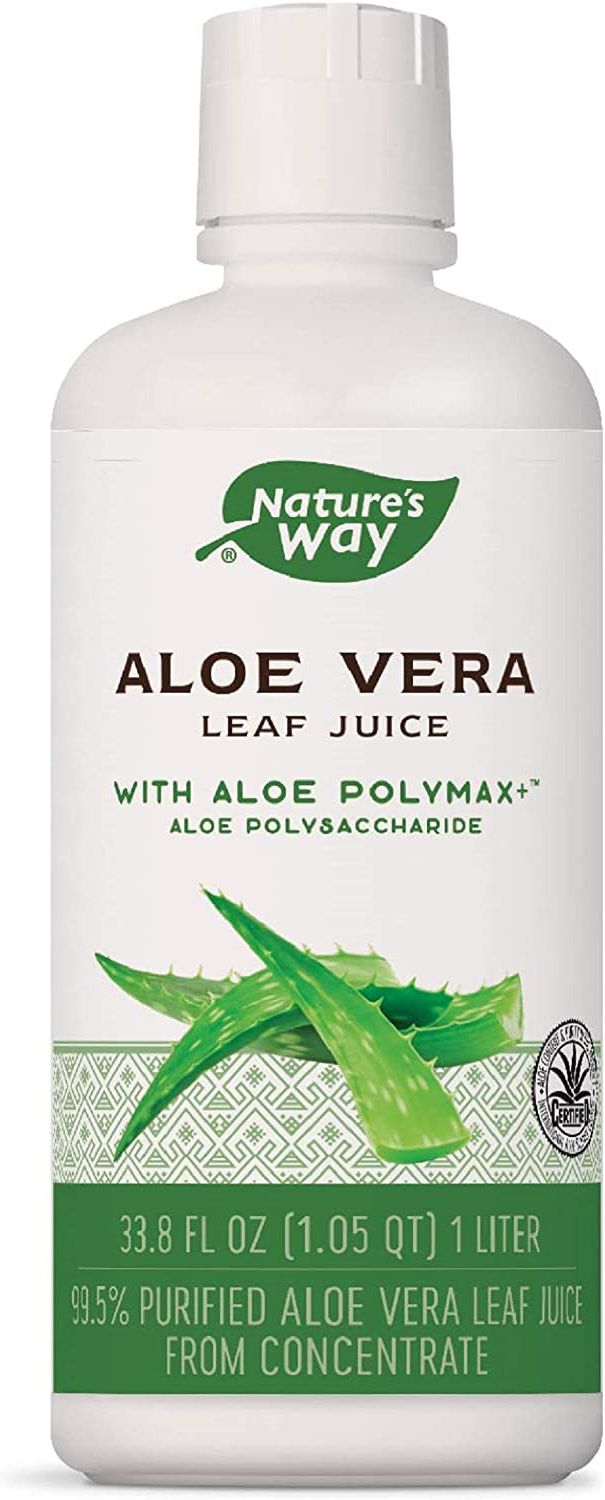
The main selling point of Nature’s Way Aloe Vera Leaf Juice is its trademarked “PolyMax” polysaccharide extract that is included along with the usual aloe vera juice.
This, plus the preservatives and stabilizers, make this product substantially more expensive than other liquid-based options, so you’ll have to decide whether the polysaccharide extract is worth it for you. The health benefits of that compound are not as well researched as those of the aloe vera leaf, so it’s up to you to make the call.
7. Puritan’s Pride Aloe Vera Gel
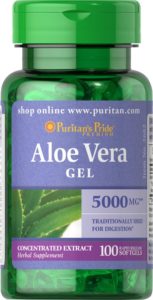
Puritan’s Pride is another aloe vera gel concentrate supplement that uses a 200 to one concentration process. Each capsule of Puritan’s Pride provides 25 mg of concentrate, or 5 grams of original gel if you do the math.
It’s a little less cost-effective, and it does contain soybean oil, which is a cheaper solvent and may cause issues for people with soy sensitivities, but beyond this, it’s hard to find too much fault in Puritan’s Pride.
8. Seven Minerals Aloe Vera Gel
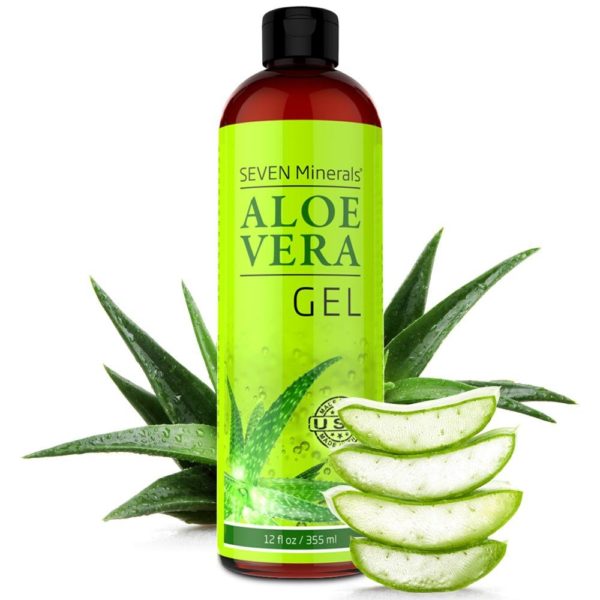
Got sunburn? Seven Minerals is the easiest way to use aloe vera to treat it. While it’s not fit for internal use, Seven Minerals manages to keep purity high while making this aloe vera easy to use on skin. By adding all-natural agar, extracted from algae, this aloe vera gel has a nice, thick consistency that won’t run when you apply it to burnt skin.
9. Just Javik Organic Aloe Vera Powder
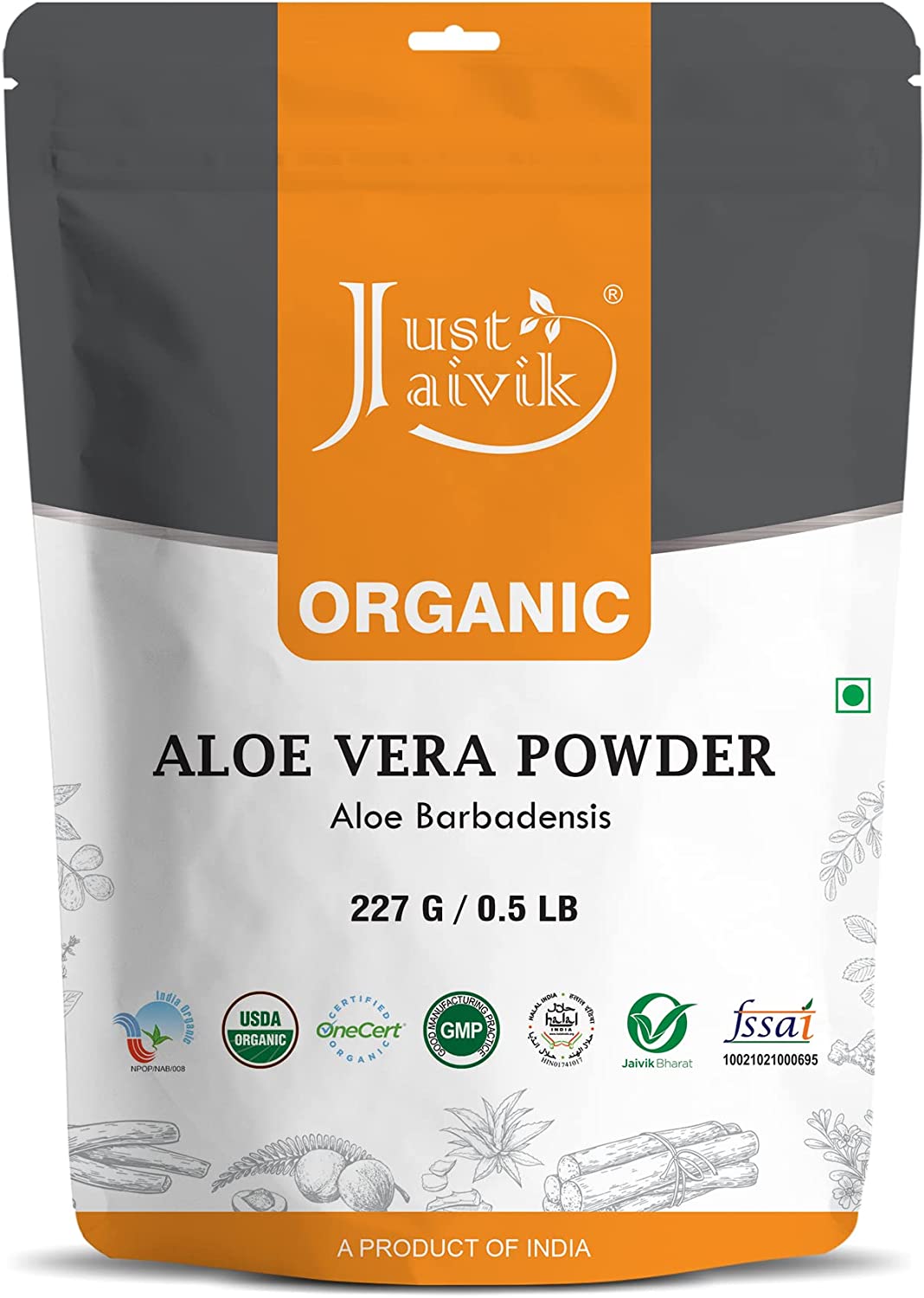
This is another option for the do it yourself-er. Just Javik makes the interesting choice of offering a powdered version of aloe vera. Instead of juicing the leaves and selling the concentrate, Just Javik instead allows the aloe vera leaves to dry, then crushes them into a powder.
Having the powder is advantageous in some respects, as it allows you to gain the benefits of the phytonutrients in the leaf fiber. There is one big drawback though: it’s not edible. You wouldn’t want to eat it anyways, because of the fiber content. So, this one is great for cosmetics, but not for oral supplementation.
10. Lily of the Desert Aloe Vera Gelly
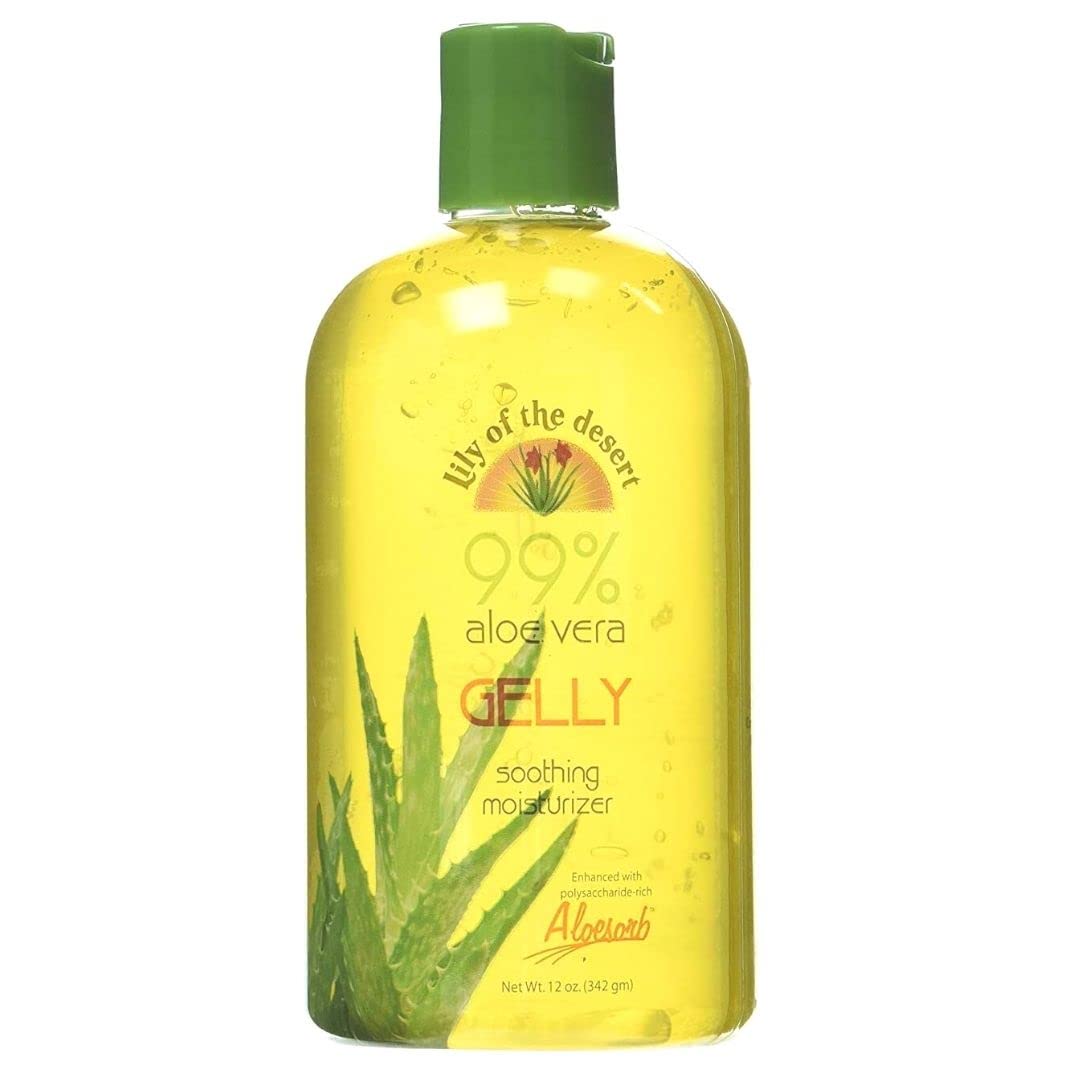
Now, even though this one is listed as a “supplement,” it’s clearly not designed for internal use! Lily of the Desert is strictly a cosmetic product, which is not to detract from its uses. It’s got thickeners, stabilizers, and several skin-nourishing ingredients.
But you pay extra for this, and the fact that you can’t double-dip and drink it as well is actually a pretty important point to make. With the bulk aloe vera gels, you can use them for both external and internal use.
Category winners
Best aloe vera overall: Earthen Aloe Vera
With a potent ten grams equivalent of aloe vera per softgel, Earthen Aloe Vera is the easiest way to add supplemental aloe vera to your routine. Its incredibly clean design and high dose makes it the best all-around aloe vera supplement on the market.
Best aloe vera for skin: George’s Always Active Aloe
This 100% pure aloe vera distillate is easily the best option for skin health if you are looking for aloe vera that’s easily applied topically and has no additives or preservatives.
Best aloe vera for constipation: Earthen Aloe Vera
With its high dose and simple supplement design, Earthen Aloe Vera is your best option if you want to clear up constipation using the natural laxative properties of aloe vera. Why bother with other brands bloated with extra ingredients?
Best aloe vera for hair: George’s Always Active Aloe
If you’re using aloe vera for shinier, healthier hair, you don’t want anything but pure aloe vera distillate. George’s delivers on that front, making it great for use on its own or for mixing into your own homemade hair products.
Best aloe vera for gastrointestinal problems: Earthen Aloe Vera
For an irritated bowel, gas, or bloating, try Earthen Aloe Vera. Its pure aloe vera formulation and high dosage make it a great option for using aloe vera for gastrointestinal health.
Best aloe vera for sunburn: Seven Minerals Aloe Vera
If you’re in need of a sunburn soother, Seven Minerals has you covered. Its American-grown aloe vera is thickened with agar to give it a gel-like consistency, which makes it much easier to apply to sunburned areas.
Who should buy aloe vera?
Aloe vera is a great compliment to sunscreen, as it helps heal sunburn, but it does a lot more than heal your skin. Here’s who should consider an aloe vera supplement.
People who want to protect their skin. Aloe vera can treat sunburn, but it’s also great for enriching the antioxidant content of your skin, which helps fight aging-related changes in skin elasticity.
People with inflammation-related GI tract problems. Aloe vera contains powerful antioxidants and anti-inflammatory agents, and as such, it’s often used to treat health problems that cause inflammation or irritation of the gastrointestinal tract, like ulcerative colitis. If you have this or other GI conditions linked to inflammation, aloe vera might be worth a shot.
While aloe vera is not for everyone, it has a long history of use in traditional medicine and attracts people who are fans of natural remedies for health conditions.
How we ranked
While there are plenty of great aloe vera products out there for sunburn and skincare, we only focused on supplemental forms of aloe vera that are geared towards the systemic effects of aloe vera. Here’s how we narrowed the field.
Including high-quality liquids and capsules. We carefully considered the benefits of aloe vera capsules versus liquid aloe vera leaf juice. Since both have their respective advantages and disadvantages, we included both in our rankings, albeit with slightly different criteria.
Purity mattered most for liquid aloe vera. For liquid form aloe vera, purity was the utmost concern. Since dosage is pretty much irrelevant (you can measure out however much you need), we evaluated these supplements on the source of the aloe vera, as well as the presence or absence of any additional ingredients.
No flavoring or preservatives. We ranked very pure products highly, especially if they had perks like coming from an organic grower of aloe vera plants. On the flip side, liquid aloe vera products that had flavoring and preservatives ended up lower in the rankings, or didn’t make them at all.
Dosage and supplement design mattered most for capsules. For capsule-based aloe vera products, we examined both the dosage and the supplement design. Dosage was rated as equivalent to pure aloe vera gel (capsules contain a concentrated form), and we prioritized higher-dose products as opposed to lower-dose ones.
We also had a slight preference for vegan cellulose-based capsules, given that aloe vera is a favorite among plant-based diet enthusiasts, but didn’t put an inordinate amount of weight on this requirement.
We did, however, strongly prioritize clean supplement design, meaning we eliminated products with a lot of binders, fillers, and additives, and rated those with only a couple ingredients highly.
Since our final rankings have a balance of capsules and liquid, as well as a range of doses, just about everyone can find an aloe vera product that’s right for them.
FAQ
Q: What is aloe vera good for?
A: In addition to its well-publicized ability to help heal sunburn, aloe vera gel is a popular supplement for tamping down on inflammation and irritation in the digestive tract.
It’s been studied as a treatment for ulcerative colitis, and it may also hold promise for similar conditions like Crohn’s disease and irritable bowel syndrome. Aloe vera also shows promise for treating type two diabetes, and for combating viral conditions like cold sores and other oral infections.
Q: Does aloe vera have benefits for men?
A: Perhaps because aloe vera is traditionally thought of as a skincare product, and skincare tends to be more popular among women, aloe vera is not often thought of as useful for men.
While there isn’t any research in humans that suggests aloe vera could be particularly beneficial for men, some very preliminary work from researchers in Iran has found evidence that aloe vera can boost testosterone levels and improve sperm quality in rats (1).
As you probably suspect, research in rats does not necessarily translate to humans—indeed, other work in rats also suggests that aloe vera could cause cancer, so interpret this testosterone research with caution.
Q: Is aloe vera good for weight loss?
A: Aloe vera has not been studied in detail as a natural weight loss supplement. However, some preliminary research does indicate that aloe vera may contain compounds that are helpful for controlling the symptoms of one of the biggest chronic conditions that is associated with being overweight: type two diabetes.
Research out of Japan has identified five different molecular compounds in aloe vera that have anti-diabetic effects, indicating that aloe vera could help control blood sugar and combat insulin insensitivity (2).
Though aloe vera might not help you lose weight, more research may lead to it being used as a way to control some of the negative effects of being overweight or obese.
Q: Can aloe vera help your hair?
A: Given that skin and hair actually contain many of the same proteins, it shouldn’t be shocking that liquid aloe vera can help your hair.
Though there haven’t been any formal scientific studies on the matter, some beauty product aficionados swear by washing their hair with aloe vera leaf juice on a regular basis.
The aloe vera, they claim, helps restore their hair follicles leaving them healthier and shinier than before. Could aloe vera really be a useful hair product? Only more research will tell.
Related articles
Recap
Aloe vera provides a natural option for treating skin issues, improving oral health, bumping up antioxidant intake, and may also help in regulating blood sugar.
It shows some promise for inflammatory conditions of the digestive tract as well, including ulcerative colitis. Aloe vera does carry the risk of damage to the kidneys and liver, and has been associated with low calcium levels, diarrhea, and may be carcinogenic, according to animal studies.
It hasn’t been studied well enough to establish firm dosage recommendations, but somewhere in the vicinity of 100 ml or 100 mg per day seems like a good place to start based on work done so far.
For BodyNutrition’s #1 aloe vera recommendation, click here.